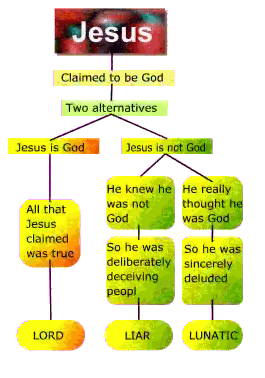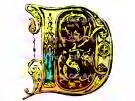
 ear Gentle Reader,
ear Gentle Reader,
We have come to the end of the month (plus one day I started with the Conspiracy - which no one got by the way so here is the answer you may want to copy it down
"wherein ye once walked according to the course of this world, according to the prince of the powers of the air, [Satan, the Devil ] of the spirit that now works in the sons of disobedience; among whom we also all once lived in the lust of our flesh, doing the desires of the flesh and of the mind, and were by nature children of wrath, even as the rest:--but God, being rich in mercy, for his great love wherewith he loved us, even when we were dead through our trespasses, made us alive together with Christ (by grace have ye been saved)," Booh of Ephesians Chapter2.
"I am trying here to prevent people saying the really foolish thing that people often say about him: 'I'm ready to accept Jesus as a moral teacher, but I don't accept his claim to be God.' That is one thing we must not say. A man who was merely a man and said the sort of things that Jesus said would not be a great moral teacher. He would either be a lunatic - on a level with a man who says he is a poached egg - or else he would be the Devil of Hell. You must make your choice. Either this man was, and is the Son of God; or else a madman or something worse. You can shut him up as a demon, or you can fall at his feet and call him Lord. But don't come up with any patronizing nonsense about him being a great moral teacher. He hasn't left that alternative open to us."
- Lunatic: Jesus was not the son of God, but he mistakenly believed that he was.
Jesus said many things which would be outrageous if he was just a man. If he is God then those same sayings are reasonable.
Here are some examples:
-
Jesus said that we should love him more than our wives, more than our parents, more than our children and more than ourselves (Matthew 10:27; Luke 14:26)
-
He said that if we wanted eternal life we had to follow him (Mark 10:17-21)
-
He said that “whoever loses his life for my sake will find it.” (Matt 10:39)
-
He claimed: "I am the way and the truth and the life. No one comes to the Father except through me.” (John 14:6)
-
He claimed to be able to forgive sins. His critics objected that no one but God had the authority to forgive sins. They were right, but they had missed the point that Jesus was God. (Matt 9:6; Mark 2:7, 10; Luke 5:21, 24)
-
He said that: "before Abraham was born, I am!" (John 8:5) – Abraham lived thousands of years before Jesus.
-
- Liar: Jesus was not the son of God, and he knew it, but he said so anyway.
- Lord: Jesus was the son of God, and thus spoke the truth.
The trilemma is principally associated with C. S. Lewis, who originally proposed the argument in his book Mere Christianity. He contends that there are three probable alternatives, all or any of which, or some variant, may logically be chosen over the choice of calling Jesus a "great human teacher". Lewis's trilemma is therefore a straightforward question on the basis of the Biblical view of Jesus: it compels a choice of any option except the logically excluded alternative that Jesus was "a great human teacher" (and from among the remaining alternatives, he argues that Jesus is God). Lewis does not propose the argument as a proof of the deity of Christ, but attempts to portray as foolish those who dismiss Jesus as merely a moral teacher. However, he was ultimately persuaded that the choice of Jesus as Lord is no less probable than the alternatives, and far more preferable.
More recently, Christian evangelist Josh McDowell has used a farther-reaching variant of Lewis's trilemma in an attempt to prove that Jesus was God. Arguing that the first two options are not acceptable for a number of reasons, we are forced to believe Jesus's claim to be the son of God. McDowell, surpassing Lewis's point, suggests that the trilemma logically compels Christian belief. First he attempts to demonstrate the historical reliability of the Bible, and then uses that in conjunction with the trilemma to conclude that Jesus is divine.
Ronald Reagan also used the trilemma in a reply to a liberal Methodist minister who denied the divinity of Christ.
The trilemma rests on the assertion that Jesus was a living person who did claim to be the unique Son of God. Skeptics have offered numerous alternatives to the trilemma. For example, Jesus may have been a fictional character (either wholly, as someone invented to portray moral principles, or partly, based on a real person but exaggerated); his words may have been misquoted or misinterpreted; he may have been honestly mistaken about his nature; or he may have suffered some mild delusions without being completely insane. Apologists argue that there is reliable evidence that Jesus really existed and made claims to forgive sins and send prophets, which in the Jewish monotheistic culture would be taken as claims of Godhood.
Another possibility is that Jesus only meant to speak of himself as a son of God, in the same way that all of humanity are sons and daughters of God. Critics point out that the New Testament does not quote Jesus as directly claiming to be the unique "Son of God". Christian apologists argue that other quotations of Jesus prove that he did indeed consider himself the only Son of God. They refer to scriptural quotations by Satan, demons, and Jesus's disciples that refer to him as the Son of God (see especially Matthew 4:3, Matthew 8:29, Mark 3:11, and Matthew 14:33), after which Jesus does not correct them. They also point to John 3:16, where they argue Jesus is referring to himself as the unique Son of God; John 8:58, where Jesus says "Before Abraham was, I am" (egō eimi εγὼ ειμἱ), taken by apologists as reference to the Tetragrammaton;
The Tetragrammaton (Greek: τετραγράμματον; "word with four letters") is the usual reference to the Hebrew name for God, which is spelled (in the Hebrew alphabet): י (yodh) ה (heh) ו (vav) ה (heh) or יהוה (YHWH). It is the distinctive personal name of the God of Israel.
and to Mark 2:5, where Jesus forgives the sin of a paralytic. On the one occasion where Jesus is reported as asked directly (Matthew 26:63), he does not give a direct answer, instead replying "su eipas", which roughly translates as "you have said it yourself", and going on to say something about the Son of Man that will be seated in the clouds.
So Gentle Reader, Who do you say Jesus Christ is?
Dennis



No comments:
Post a Comment